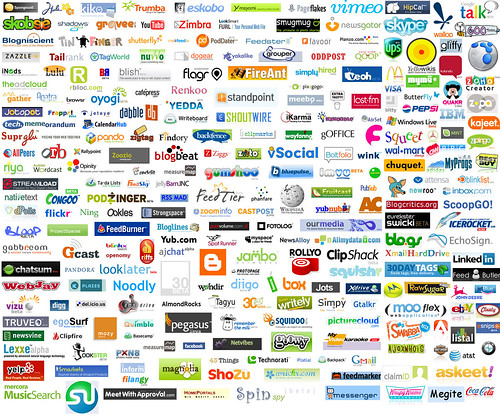Web 2.0 Life
 I get a lot of flack from peers for my enthusiastic participation in Web 2.0. By Web 2.0, I mean the interactive, social media frenzy that has swept the internet by storm in the past years. Let me take you through my list of drugs.
I get a lot of flack from peers for my enthusiastic participation in Web 2.0. By Web 2.0, I mean the interactive, social media frenzy that has swept the internet by storm in the past years. Let me take you through my list of drugs.
1. Facebook: This one doesn't require too much justification, as it's a social necessity for most college students. However, beware hyperactivity on facebook as it signals hyper loserdom.
2. MySpace: There's a little bit of nausea associated with MySpace, but I have one nevertheless. It's the philistine's venue for social networking unless you are a celebrity or pseudo-famous personality of some sort. I am neither, so I am rarely on MySpace unless to post a new song.
3. Twitter: I get the most heat for my zealous tweeting. Tweet (verb): the act of posting a 140-character message on Twitter; (noun): a 140 character message posted on Twitter. "What's the point? Who cares? It's just a facebook status update! Blah blah blah."
Haters, stop sipping the haterade.
Twitter, for me, is often a replacement for my Google Reader. Google Reader is a blog aggregator, which gathers newly posted entries from all the blogs I read. It's a good way to sift through all the crap in 140 characters or less!
In addition, Twitter can be a source of instant news. Instead of refreshing The New York Times or Washington Post homepage over and over again, I just keep an eye on the Twitter universe via TweetDeck. A literal tweet that sounds a little like a purr alerts me to new posts. Twitter isn't for everyone. If you're not using a computer during the day, it might not be the application for you. But Twitter is also one of the most pushed aside Web 2.0 services. Don't knock it 'til you've tried it.
4. Blogger/Wordpress: The blogosphere is an intimidating realm to enter. First, you have to overcome the nagging feeling that no one cares what you write. Second, you choose your topic. Will you write about an industry, politics, or yourself?
In writing about myself with my identity front and center, I've had to engage in a little bit of censorship. I've rarely found it to be a problem, but knowing that family members, friends, and even potential employers might land on the site adds occasional pressure.
I sometimes even feel embarrassment when I tell people that I blog. It's a little bit like telling a colleague I still collect comic books (I don't anymore). There's this initial assumption that my blog is an excuse to engage in some type of online exhibitionism. But for me, it's simply good practice to write; to observe; to comment.
I highly encourage anyone who feels the need to write to start blogging anonymously or as yourself. If anything, it incorporates accountability in writing. Going a week or more without an entry is probably letting someone down in the vast internet.
5. LinkedIn: If you're a job seeker and not on LinkedIn, sign up immediately and establish a network. In the early stages of a career, perhaps it might be less useful. Even so, start early. Jobs are posted and passed around on LinkedIn, and it's a fast and more interactive way to get referred and hear about opportunties by word of mouth.
Now, my conclusion. Web 2.0, despite its ubiquity, is still only embraced by a certain (read: nerdy) type of crowd; it's not everyone's cup of tea. Still, it's important to at least know what these Web 2.0 concepts are.
Whether you're 20 or 65, don't find yourself left behind asking someone what a blog is. We may find ourselves confused and disoriented by technology at only age 40 if we continue to turn a blind eye, just as many of our grandparents find themselves baffled by Ipods, laptops, and the internet. Don't neglect Web 2.0 without reason. Know what Twitter, facebook, and MySpace are before you make an informed decision to participate or not to particpate.
